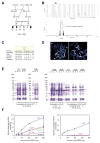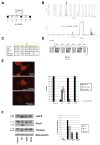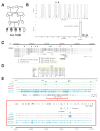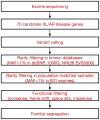Using whole-exome sequencing to identify inherited causes of autism
- PMID: 23352163
- PMCID: PMC3694430
- DOI: 10.1016/j.neuron.2012.11.002
Using whole-exome sequencing to identify inherited causes of autism
Abstract
Despite significant heritability of autism spectrum disorders (ASDs), their extreme genetic heterogeneity has proven challenging for gene discovery. Studies of primarily simplex families have implicated de novo copy number changes and point mutations, but are not optimally designed to identify inherited risk alleles. We apply whole-exome sequencing (WES) to ASD families enriched for inherited causes due to consanguinity and find familial ASD associated with biallelic mutations in disease genes (AMT, PEX7, SYNE1, VPS13B, PAH, and POMGNT1). At least some of these genes show biallelic mutations in nonconsanguineous families as well. These mutations are often only partially disabling or present atypically, with patients lacking diagnostic features of the Mendelian disorders with which these genes are classically associated. Our study shows the utility of WES for identifying specific genetic conditions not clinically suspected and the importance of partial loss of gene function in ASDs.
Copyright © 2013 Elsevier Inc. All rights reserved.
Figures





Comment in
-
Rare inherited variation in autism: beginning to see the forest and a few trees.Neuron. 2013 Jan 23;77(2):209-11. doi: 10.1016/j.neuron.2013.01.010. Neuron. 2013. PMID: 23352155 Free PMC article.
References
-
- Applegarth DA, Toone JR. Nonketotic hyperglycinemia (glycine encephalopathy): laboratory diagnosis. Molecular Genetics and Metabolism. 2001;74:139–146. - PubMed
-
- Applegarth DA, Toone JR. Glycine encephalopathy (nonketotic hyperglycinaemia): review and update. Journal of inherited metabolic disease. 2004;27:417–422. - PubMed
-
- Attali R, Warwar N, Israel A, Gurt I, McNally E, Puckelwartz M, Glick B, Nevo Y, Ben-Neriah Z, Melki J. Mutation of SYNE-1, encoding an essential component of the nuclear lamina, is responsible for autosomal recessive arthrogryposis. Human Molecular Genetics. 2009;18:3462–3469. - PubMed
Publication types
MeSH terms
Grants and funding
- R01 MH083565/MH/NIMH NIH HHS/United States
- T32 NS007473-12/NS/NINDS NIH HHS/United States
- T32 AG000222/AG/NIA NIH HHS/United States
- RC2 MH089952/MH/NIMH NIH HHS/United States
- T32 NS007484-08/NS/NINDS NIH HHS/United States
- P30 HD018655/HD/NICHD NIH HHS/United States
- 1RC2MH089952/MH/NIMH NIH HHS/United States
- T32 MH020017/MH/NIMH NIH HHS/United States
- R01 NS048276/NS/NINDS NIH HHS/United States
- T32 GM007753/GM/NIGMS NIH HHS/United States
- T32GM07753/GM/NIGMS NIH HHS/United States
- K23 MH080954/MH/NIMH NIH HHS/United States
- K23NS069784/NS/NINDS NIH HHS/United States
- T32 NS007473/NS/NINDS NIH HHS/United States
- 1K23MH080954-01/MH/NIMH NIH HHS/United States
- K23 NS069784/NS/NINDS NIH HHS/United States
- T32 NS007484/NS/NINDS NIH HHS/United States
LinkOut - more resources
Full Text Sources
Other Literature Sources
Molecular Biology Databases

